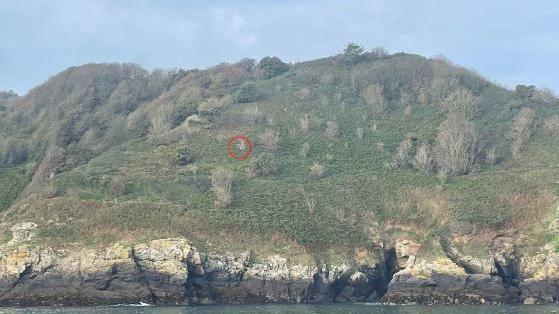Huge Asian hornet nest removed in Sark

The alarm was raised when a hornets' nest was spotted from a ferry
At a glance
A huge nest of Asian hornets has been discovered and destroyed in Sark
The nest contained more than 750 potential new queens, which could have posed a serious threat to local wildlife and bee populations, officials said
The public is urged to report any sightings of Asian hornets to the Asian hornet team
- Published
A huge nest of Asian hornets has been discovered and destroyed in Sark.
Guernsey’s Asian hornet team and a Jersey researcher found a nest, which measured nearly 20in (50cm) by 27in (70cm), hanging from a sycamore tree branch.
The nest, which was visible from the Sark ferry, contained more than 750 potential new queens, which could have posed a serious threat to the local wildlife and bee populations.
The nest was spotted by Chris Isaacs, who was travelling to Sark for the Inter-Island Environment Meeting at the end of September.
The nest is retrieved and, right, with Peter Cunneen, Sark’s Asian hornet volunteer coordinator
He alerted the Guernsey team, which treated and removed the nest within hours.
The nest was frozen for 48 hours to kill any remaining insects.
This was the sixth nest to be safely removed in Sark this year as part of the ongoing collaboration between Guernsey and Sark authorities to control the invasive species.
Examination of the nest confirmed that, although a few queens were already present, a substantial number were just on the point of emerging, said the States of Guernsey.
They would have been expected to leave the nest in the next two weeks, it added.
Consequently, the nest was removed at a crucial time, said the States.
Peter Cunneen, Sark’s Asian hornet volunteer coordinator, said: "This nest has eluded me since early June, so I am extremely grateful to Chris Isaacs for spotting it from the ferry and to both the Jersey and Guernsey Asian hornet teams for all the help they’ve provided."
Asian hornets are native to Asia and were accidentally introduced to Europe in 2004.
They prey on honeybees and other insects, and can also sting humans.
More information on how to identify an Asian hornet can be found here, external.
Follow BBC Guernsey on Twitter, external and Facebook, external. Send your story ideas to [email protected], external.
Related Topics
Related internet links
- Published4 September 2023
- Published20 September 2023
- Published7 October 2023